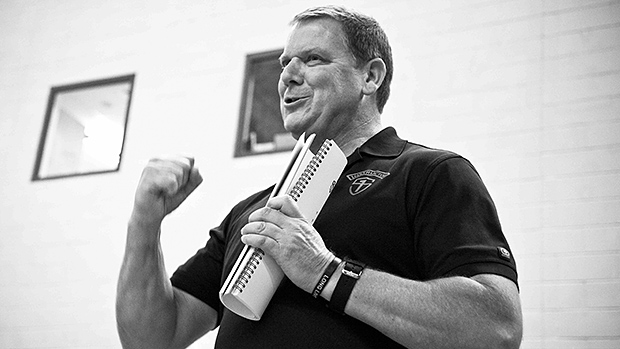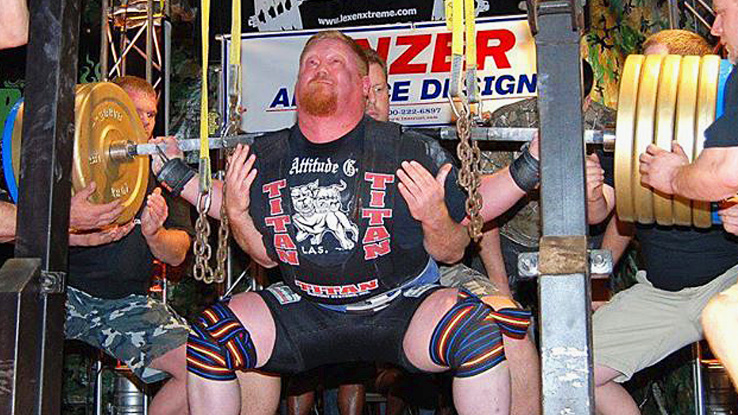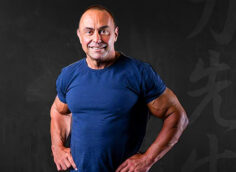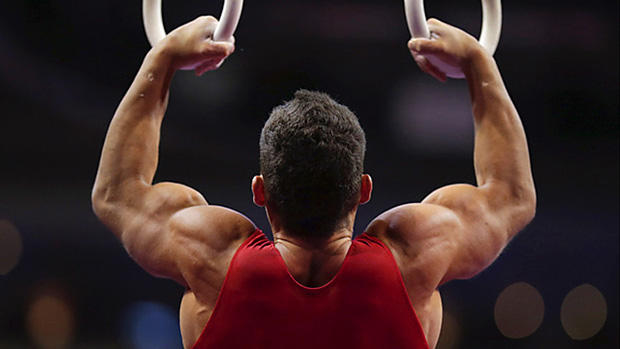The Classic Tips
Years ago, I offered this list of tips for athletes:
- Use whole body lifts; rarely isolate a muscle.
- Constantly strive to add weight to the bar and move it faster.
- The best anabolic is water.
- Did you eat breakfast? If not, don't ask me anything about nutrition.
- If you smoke or don't wear your seatbelt, please don't tell me the quick lifts are dangerous.
- Go heavy, go hard.
- Keep it simple. Less is more.
- You have to put the bar over your head.
- Put the bar on the floor and pick it up a bunch of different ways.
- Know and love the roots of your sport.
I still stand by this list; however, the past few months of coaching and working with athletes have taught me a few new lessons. The first three contain warnings, the second three are the hard won lessons, and the last four are the tips that work in life, in love and in lifting, but not in that order.
The Warnings
1 – Beware of anything that makes no sense.
Okay, everybody try this: breathe through your eyes.
"I'm sorry, Dan, I thought you said to breathe through my eyes."
Yes, yes I did. Now, imagine yourself as a fetus in the womb of the universe.
"What?!"
Exactly.
My first tip is to beware of anything that makes absolutely no sense to you. If you're at the local nutrition store and the assistant day manager begins to spout about how the regression of this or that can be subdiverted by the axial dynamic of a bottle of stuff costing $99, be sure to back away slowly. My favorite new thing in the nutrition stores is the "locked" glass cabinet. Certainly, something that has to be locked behind glass must be worth more than I make in a week!
"Breathe through your eyes" takes on many variations. There's nothing worse than when someone takes a community education course and becomes an expert on how yoga is the best way to burn the visceral fat that's housed deep in your abdomen. "Breathing deep" will flush it out. Well, doesn't that make sense? You have fat deep in your belly, so to eliminate it you do deep belly breathing and the air will carry the fat out.
If someone tells you that lifting slow makes you fast or that jolting your abs with an electric shock every few seconds will carve out a six-pack, try to breathe through your eyes. It'll bring clarity.
2 – Beware the real estate professor who doesn't own real estate.
Several years ago I asked my buddy, Jerry, how he became so rich. (Jerry has some serious money.) He told me a very simple story. He'd gone to the local university and started taking courses to become a successful business man. During the first week, a student asked the professor in the real estate course about the professor's holdings. The prof said he didn't own any.
Jerry dropped out of school that day and took up a career in real estate. He said, "If this guy's students are my competition, I should be a millionaire in no time." Jerry was right.
No, you don't have to be Mr. Greater Westphalia to be an expert in nutrition or in training, but you need to look like you bumped into a weight somewhere in your life!
Generally, I find that I learn the most from people from other disciplines. I've heard great advice from ballerinas, martial artists and monks on things that have done wonders for my training. But the point is simply this: if somebody is telling you to radically change your training merely on a whim or unsupported opinion, ask them simply to try it on themselves first. Beware advice from somebody who doesn't put the advice into practice.
3 – Beware overkill.
Here's an example of overkill:
"If jumping off a small box helps my vertical leap, then jumping off a building will help that much more."
Whenever I think about this, I'm reminded of my uncle who survived a fall of 39 stories off a building. Unfortunately, the building was 40 stories. Get it? He was fine for 39 stories; it was the last one that did him in. Of course, my uncle was an optimist. At the 26th floor a lady leaned out the window and asked, "How's it going?" My uncle answered, "So far, so good!"
Okay, sorry, enough of that. This little warning illustrated by the statement above is perhaps the most ignored in most people's training programs.
"If two sets of curls make my biceps pump, I'll do twenty and the pump will stay with me until the lights come on at the club at three in the morning."
Well, the pump doesn't last that long and what are you doing at a club that late anyway?
Basically, I'm talking about overkill here. You shoot the deer, then pump it full of twenty more shots "just to make sure." It's the most common error in sports:
- "Sixty grams of fiber a day is what some guys take to cut fat, so I'll take in 160."
- "The Bulgarians train six times a day, so I'll train twelve!"
- "Arnold got up to 240 in the off-season, so I'll get up to 480 and be twice as big!"
You've seen it. You've done it. We all do it. Stop doing it.
Hard Won Lessons
4 – Everything works.
Everything works for about two weeks. Nothing works after about six weeks. I love books that promise "Titanic Triceps in Two Weeks." Of course, the Titanic sank, didn't you know?
Things need changing. You don't have to throw everything out, but like Pavel says, you must change things up so that you do the "same, but different." So, when you change a program after two weeks, you must learn the most unused concept in training: to be subtle. Don't use a sledgehammer; use a touch of variation. Change your grip, change the angle, add a little to the rest period or cut a little off, change the order of exercises. Change it up, a little.
Now, it's possible that your training program does need a complete makeover. How can you know that? Read #5.
5 – Build a foundation of basic strength.
Generally, if healthy and fit, you should be able to do a double bodyweight deadlift and a bodyweight bench press. I won't tell you that you need to military press bodyweight, but that's what I insist on.
Why? A double bodyweight deadlift means that the posterior chain has been built up enough to begin the process of adding something to the rest of the frame. The bodyweight press is just something that's cool. I wish I had more to say about that, but that's just the way it is: if you can't bench your bodyweight, don't ask me about all the other stuff until you can do it.
If you're not yet at this level, you need to get there. All the excellent supplements available and all the great training programs you read won't put Humpty Dumpty back together until you're at these basic levels. I've worked with many people who suddenly thrive when they get their basic strength levels up to these marks.
You need to have some basic strength to support advanced training. If you don't, get it!
6 – Commit this to memory: It is your parents' fault.
There. I said it. Something that every daytime talk show blathers about each afternoon is finally true. Yes, blame your folks.
You're hamstrung by your genetic capabilities. I have a friend who played for the Utah Jazz and stands 7'4". His wife is 6'2." Now, they have three children. Do the math: will their children have a leg up (more like two feet) on you in basketball? Yes, because they will be taller than you!
The problem with genetics is this: exactly what have you been dealt in the gene pool crap shoot? You can't find out if all you do is bench press and curl! You may be standing on the finest legs since Tom Platz or Cory Everson, but if you don't ever get off the pec deck, you'll never find out the truth.
I've always wondered if I could have been an Olympic champion in kayak, fencing or team handball. Without any exposure to these events, is it possible that I was a natural in saber? Once again, I can blame my parents for not exposing me to each and every athletic competition the world has to offer. I could've been the best cow chip tosser in world history.
Now, shake your hand at the universe and blame everything else in your blame pantheon. Do a good job; don't forget your third grade teacher either.
Done? Good. Now, get back to work and forget about all of this because there's nothing, I mean nothing that can be done about it! You can stop blaming your parents now and get back to the workout.
Life Lessons
7 – Stand on the shoulders of greatness.
Guess what? Whatever you're striving for has been done before.
I've had the unique opportunity to talk with most of the elite discus throwers from the United States, including those from the 1950's, 1960's and 1970's. I sat in the stands with former world record holder Fortune Gordien who told me, "When you get stuck in practice, either do throws with iddy-biddy footwork or throw with no reverse." It's a gem I still use, and I still call them "iddy-biddy" drills.
The road to leanness can be studied by looking over the books by Clarence Bass or Vince Gironda. Interested in starting training as a teen and following it through adulthood? Read Arnold's book. The web is loaded with books and information from strongmen from the 1890's to the present. Certainly, you'll need to discern some of the information, but don't reinvent the wheel.
Generally, I avoid clichés like the plague, but "reinventing the wheel" is the greatest mistake most trainers make! Learn from the greats!
8 – Train outside.
Recently, T-Nation asked me what was the one thing missing from most modern trainers' quivers. Simply this: they need to go outside and train more.
I'm famous for my hyperbole, but in this case the following is true: You will never reach your potential if you stay in the cozy confines of your gym. Why? First, you'll never ever see anyone else except those in the cozy confines of your gym. If you're the biggest guy at the spa with your guns measuring 15 inches around, you might never be inspired to go beyond your current regime of bench, curl, bench, curl, bench, curl. Recently, I saw a young woman do 21 straight pull-ups and immediately decided that I certainly had been dogging this exercise.
But when I say train "outside," I also literally mean go outside! Get off the treadmill and run in a park. Dump the lat pulldown machine for a set of monkey bars. Drag your bar out into the field and work out. Make a picnic and eat between sets of deadlifts. Carry the bar loaded for long distances. Breath fresh air for a while and click off your DVD, CNN, or CDs.
In past articles, I've written about things like one dumbbell training which is perfect for training outdoors. Grab a dumbbell or kettlebell, put it on the floor of your car, drive out to a nice spot and simply invent a workout. Lift the thing as many ways as you can imagine and do as many reps as your body will allow.
I spend the majority of my workouts outside. Certainly, rain makes it difficult with iron, but I've trained in snowstorms and torrid summer days. I keep a towel on the bar so I don't burn my hands when I grab it, but it's well worth the effort. Besides, why go to a tanning bed when you can get a golden tan while performing multiple clean and jerks?
9 – Have some fun!
I have a workshop that emphasizes "balance." Simply, I outline four terms: work, rest, play and pray. (Pray can simply be "alone time." I'm amazed at how many of my college athletes who literally have no alone time. They're always surrounded by roommates, teammates and mate mates.) The harder you "work," the bigger the other three components have to become in proportion to your added level of work.
I'm amazed how "fun" has disappeared from the strength world. I don't mean dinking around with someone while they squat 700, I mean training that's fun. I was raised in the gym with goofy contests like max sit-ups on the steepest inclines, jumping up on things and trying to leap up and touch something with the most weight (use dumbbells, by the way. Trust me.) No, they had no Olympic medals nor trophies or award ceremonies. But, it was fun.
You need to work hard. Okay, I agree. But we have nearly forgotten the fun stuff, like training outside or competing at some silly game, and the joy of the opportunity to lift weights. This isn't the same as making fun of someone while lifting (that can be anywhere from juvenile to deadly), I'm talking about having a great time training. It's easy to measure: if you're doing something that seems like five minutes of work but it actually lasts an hour, it was probably fun.
When in doubt, listen to one of my mother's mantras: "Go outside and play."
10 – Have some passion!
Passion is a word that doesn't mean what you think it means. It means "to suffer." Now, that may not be how we use it today, but that's what the root of the word means, at least in the dictionary. Let's define it this way – Passion: To suffer for love.
I think that greatness comes to those willing to go past the sweat. I hear it all the time, "Look, see, I'm working hard. I'm sweating." Yeah, well, you'll sweat in a sauna, too. It doesn't mean nothin'.
You have to go past the "hurt," too. The hardest thing to teach young men in football is the difference between being "hurt" and being "injured." Injured means "out." You're done for today, this week, this season. "Hurt" means that you've just moved beyond the pain. Winners learn to live with hurt. In life, you're going to be hurt a lot. Bosses don't always care about your "inner child" when you blow a sale or ram an oil tanker into a dock.
Passion is learning to push beyond all of this in the pursuit of your dreams and goals. Your goals are going to cost you in every nuance of the word: physically, emotionally, financially and all the rest of the "allies" you can find.
I was once asked how to generate passion in an older athlete (like me). I wrote:
- Travel to a lot of meets.
- Hang out with your competition for long periods afterwards.
- Read everything and watch everything you can about your sport.
- Travel some more. Hang out some more. Learn more.
- Spend your money on your sport!
- See number four above!
Simple, huh?




